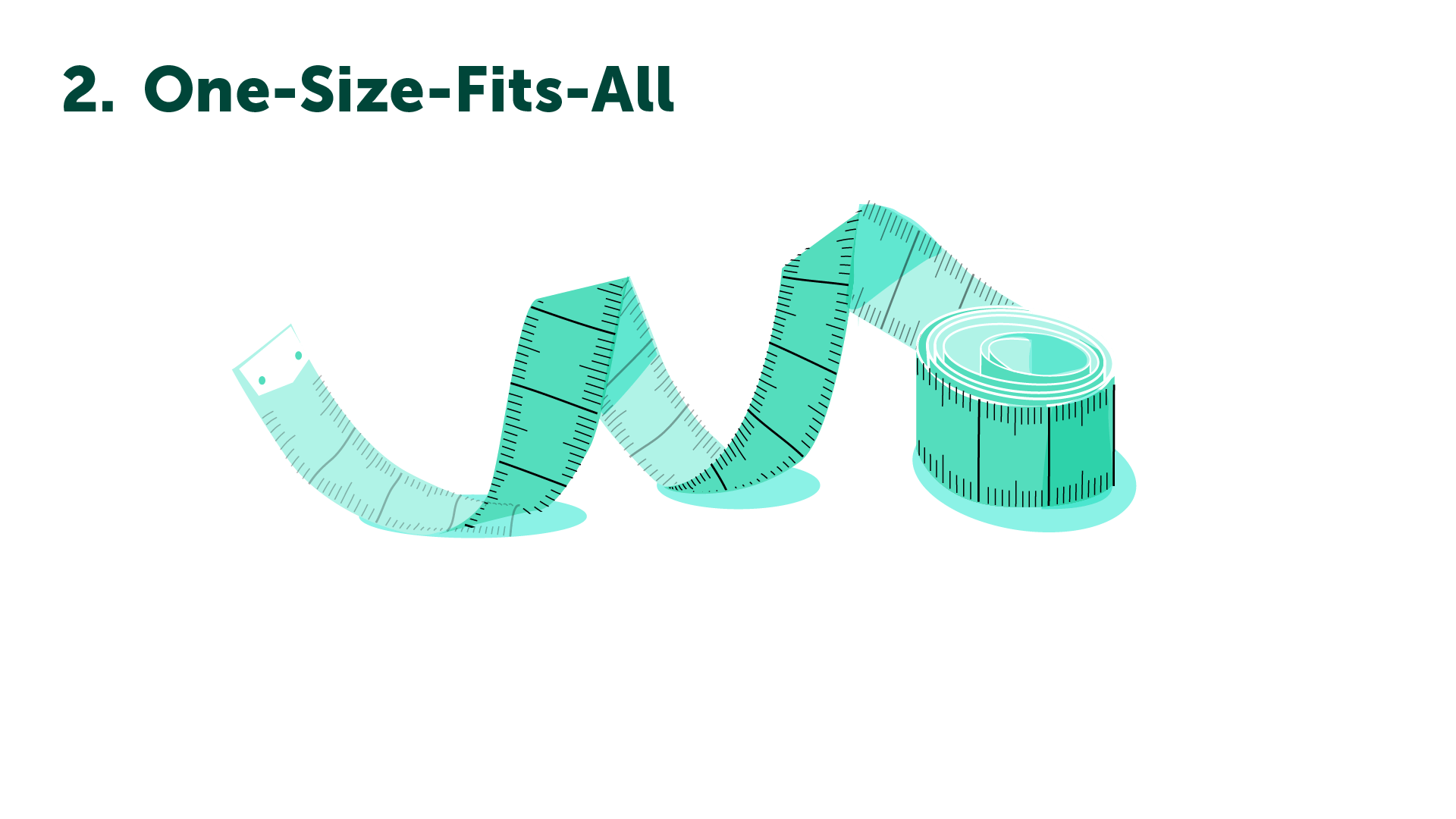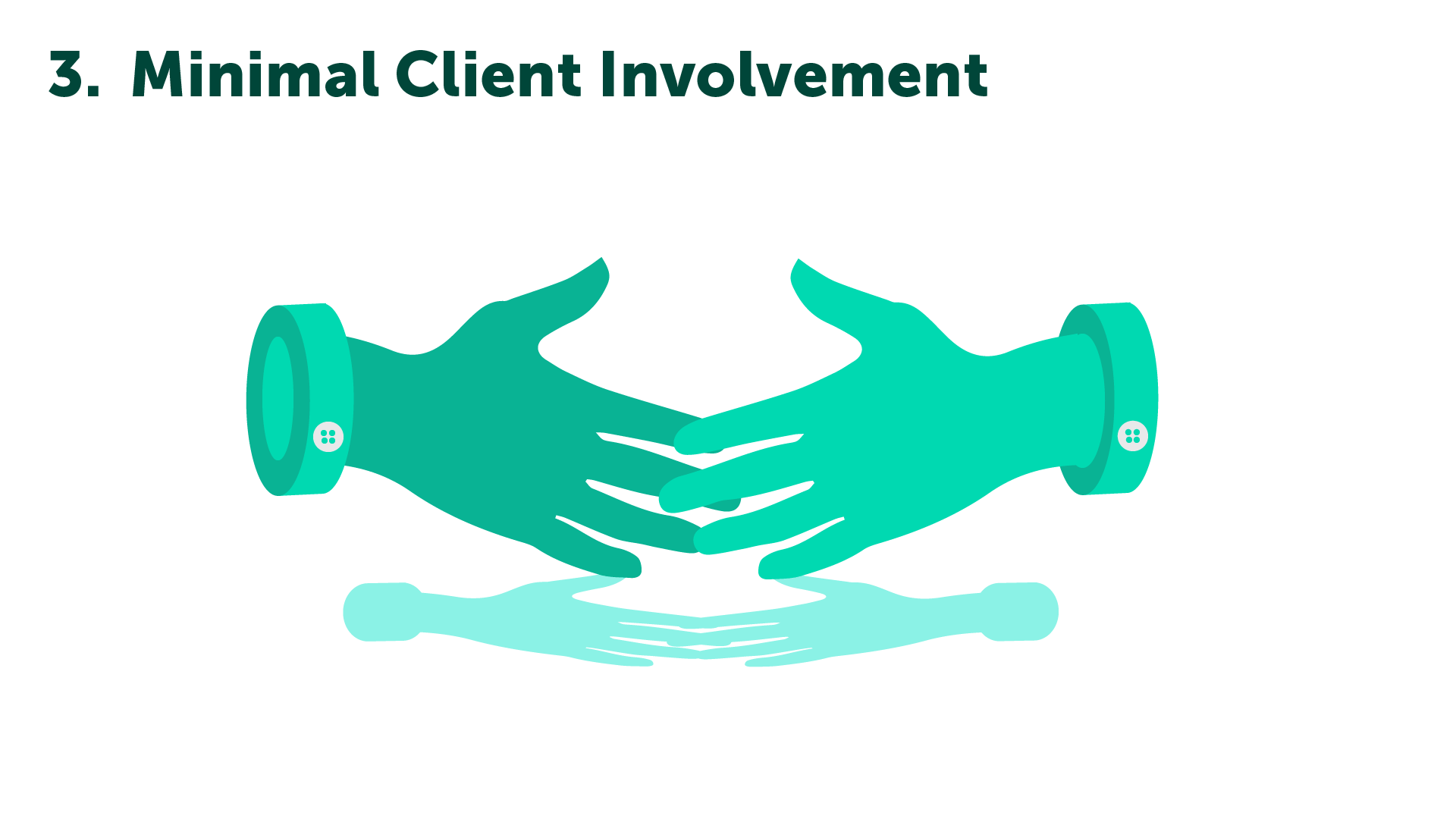In this chapter we’ll answer the following question: what is a marketing consultant? But first, we need to outline the challenges business owners often face when it comes to hiring the right kind of marketing support.
If you’re looking for expert marketing advice or considering outsourcing some or all of your marketing, then you have a difficult task ahead of you.
Many people struggle to understand what a marketing consultant actually is because there are so many different types of marketing support services and/or providers to choose from. To complicate matters further, each of these providers will take a slightly different approach.
As you search for marketing support suited to your business’ individual needs, you are likely to encounter both marketing consultants and marketing agencies, alongside other types of marketing providers.
At face value, a marketing consultant and marketing agency may seem to be performing a similar role. While there is some overlap, there are also some key differences which, unless properly considered, can rapidly lead your business down the wrong path.
This section of our guide is designed to help you make the right decision for your business by providing a definition of a marketing consultant. It explains the nature of their work, and outlines how marketing consultants differ from marketing agencies.
What is a Marketing Consultant?
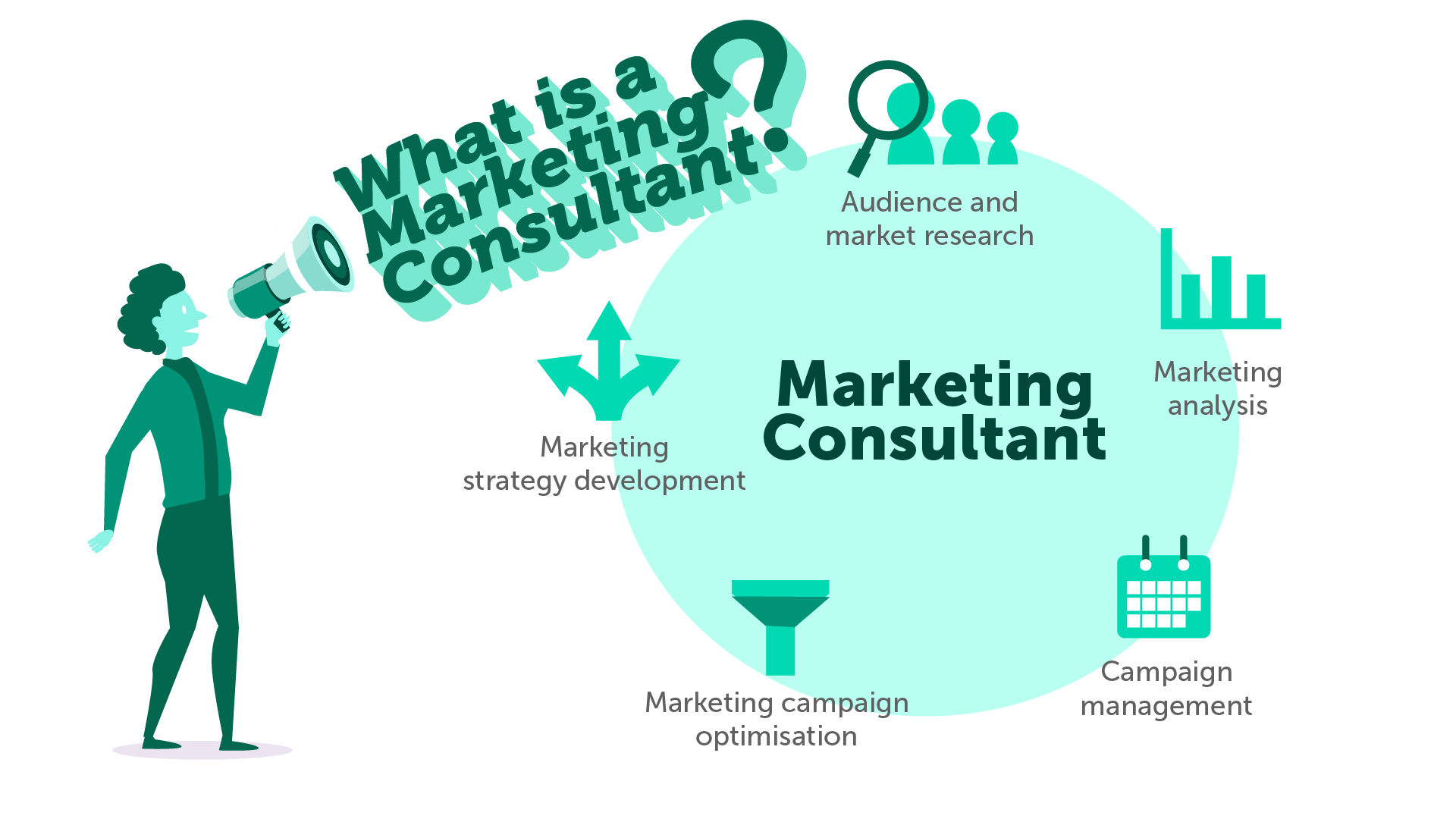 So, what exactly is a marketing consultant?
So, what exactly is a marketing consultant?
Commercially, a marketing consultant is understood to be an external specialist and advisor with advanced knowledge of marketing.
Marketing consultants can provide a wide range of services that cover:
- Marketing strategy development
- Audience and market research
- Marketing analysis
- Marketing campaign optimisation
- Campaign management
A marketing consultant empowers businesses to create an effective and strategic marketing approach grounded in data and extensive analysis.
Some marketing consultants may also be able to assist with strategy implementation and execution. Although the extent to which they can provide support in this area will vary between different consultants.
While some marketing consultants offer a comprehensive array of consultancy services, others provide a narrower, more specialist range. For example, an individual marketing consultant might specialise primarily in advising on conversion optimisation.
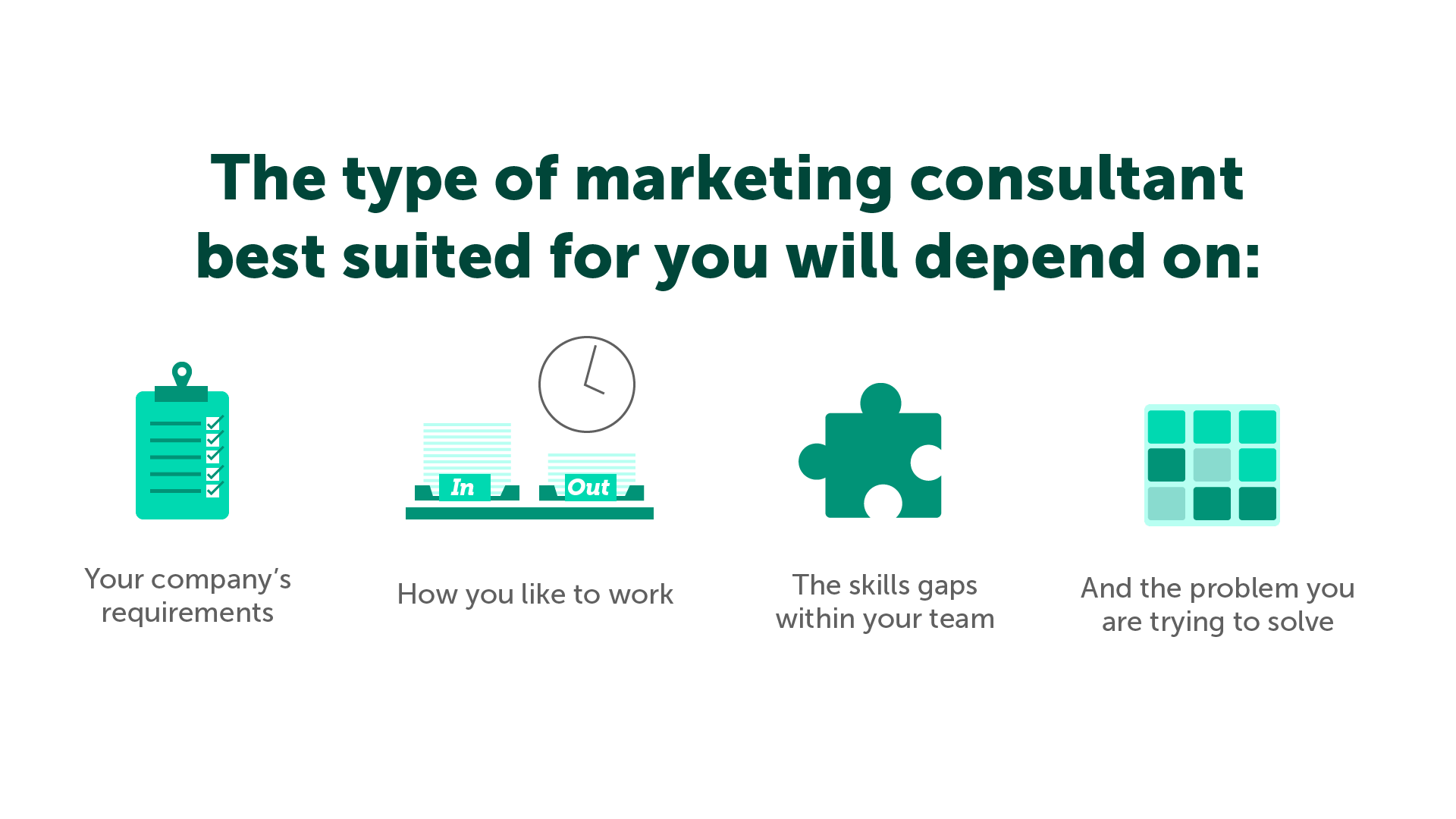
The answer to the question “what is a marketing consultant?” should always come with an important caveat—which is that every self-proclaimed marketing consultant will answer this question differently.
Answers to this question vary because our understanding of marketing varies so significantly between service providers. Because of this, it’s a marketing consultant’s approach to marketing that businesses should be interrogating.
What Does a Marketing Consultant Actually Do?
“Marketing consultant” is a bit of an umbrella term that applies to a broad range of activities.
As this chapter has already touched on, every marketing consultant will have a slightly different understanding of what their job entails. So you may be wondering what to expect from marketing consultants.
What do they do on a day-to-day basis?
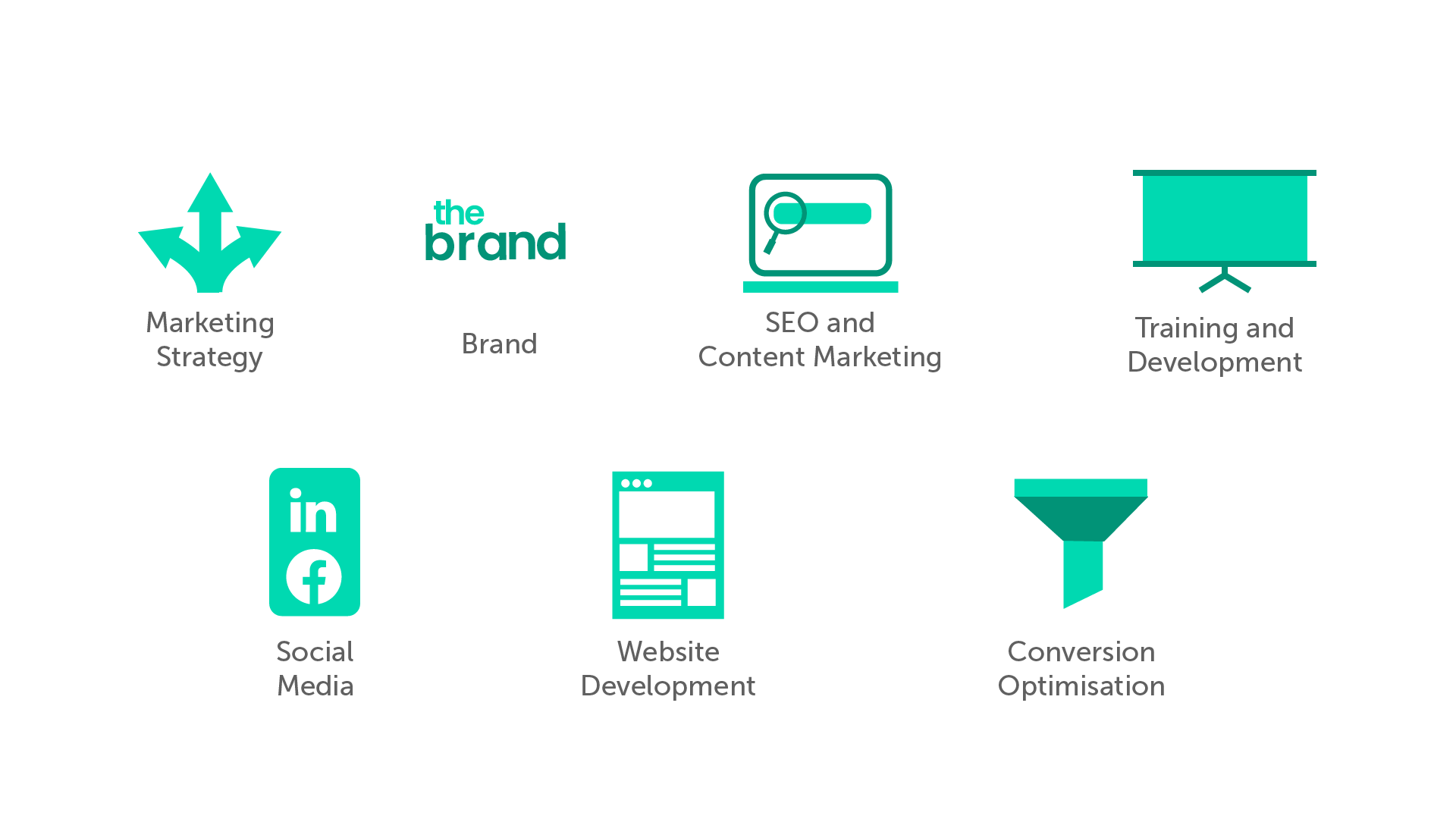 Although responsibilities vary depending on the specialist, here are some examples of the activities that marketing consultants may be contracted to undertake:
Although responsibilities vary depending on the specialist, here are some examples of the activities that marketing consultants may be contracted to undertake:
Marketing Strategy
- Conduct business and marketing analysis to provide recommendations and a roadmap for improvements
- Develop a unified marketing strategy to help you either improve your marketing of your current product or service, or to help you launch a new product or service
- Evaluate a particular marketing campaign strategy—such as digital marketing, SEO, or social media—to determine how effectively they resonate with the audience and where improvements could be made
- Identify new opportunities for engagement with existing clients, as well as new clients
- Maximise value by devising initiatives to encourage pre-existing customers to make another purchase or enlist another service
Brand
- Refine and shape your business’ branding, to help you create an identity
- Control damage and manage brand in the event that your company’s reputation takes a hit
SEO and Content Marketing
- SEO analysis, website analysis and competitor analysis
- Development of a content strategy and/or creation of search engine optimised content to boost site rankings and visibility
- Coordination of content platforms, including blog, landing pages, and website within a unified content strategy
- Outreach and digital PR support to get your brand in front of new audiences and gain backlinks
Social Media
- Improvement of customer engagement across social media platforms, often by devising innovative social media campaigns
- Management of social media and email marketing campaigns, local marketing initiatives, and digital advertising
- Design and creation of new campaign designs
Website Development
- Website development (site structure analysis, development issue analysis and even a new website build)
- Project development
Conversion Optimisation
- Track and review conversions in order to benchmark current performance and provide improvement recommendations
Training and Development
- Provide training in online digital marketing for internal teams on a particular aspect
- Work directly with business leadership to develop management and marketing strategies
- 1-2-1 consultation
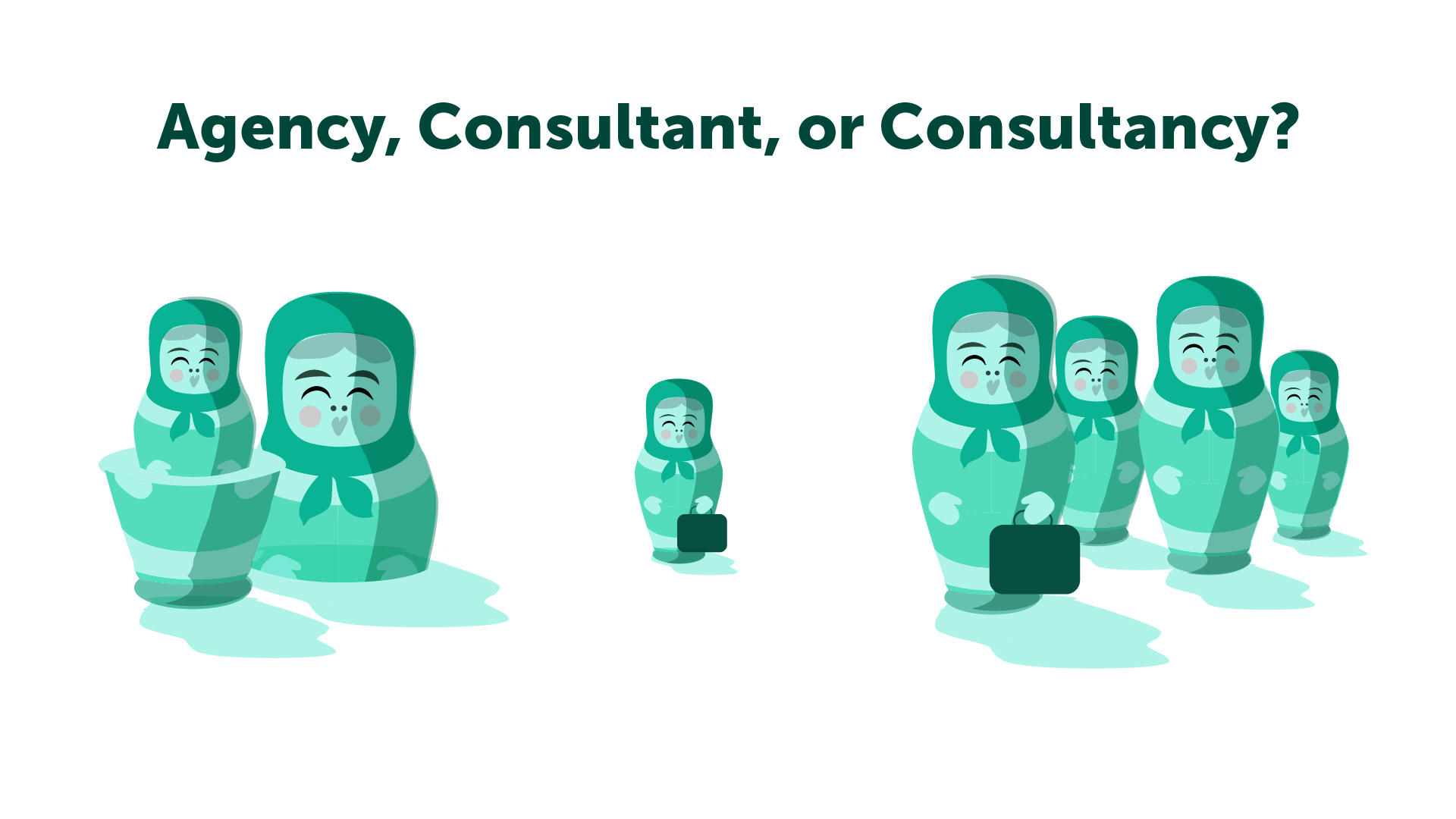
Marketing Agency, Marketing Consultant, or Marketing Consultancy – Which Should You Hire?
Once you’ve decided what problem you are trying to solve and the type of marketing support you require, you will have to determine what type of provider you’d like to work with.
Although there are many—including business coaches and management consultants—let’s take a look at the most common types of marketing support companies; an individual marketing consultant, a marketing consultancy firm, and a marketing agency.
What’s the Difference Between a Marketing Consultant and a Marketing Consultancy Firm?
In the simplest of terms, a marketing consultant is an individual expert that companies tend to work with on a one-to-one basis. A marketing consultancy, on the other hand, refers to a company with multiple employees.
Although this may seem like a trivial difference, one is likely to be more suited to your business’ individual needs than the other.
Individual Marketing Consultants
So, should you choose a marketing consultant or a marketing consultancy firm?
It really does depend entirely on your circumstances and preference. For example, smaller companies with limited marketing support requirements, may feel more comfortable working with an individual freelance marketing consultant.
There are some notable advantages to doing so. First and foremost, you will only ever need to liaise with one person. Which allows you to develop a strong working relationship.
This person, having worked with you right from the start, will know your company intimately. As such, they will have access to all the information necessary to deliver their service. This means that you’ll never have to worry about information not being communicated effectively, which is a consideration when working with a team.
Secondly, a freelance marketing consultant will only work with a handful of clients at a time due to their capacity. Therefore enabling them to give you more of their attention. However, this does not necessarily mean that you will get more of their time than if you were to work with a marketing consultancy firm.
As one person, a marketing consultant is unable to delegate to other individuals and their time is very limited—this can prove to be a disadvantage if your marketing consultant fails to manage their workload effectively or takes on too many clients.
Keep in mind that an individual freelance marketing consultant may well be managing their own admin, accounting, and other responsibilities that a marketing consultancy firm would delegate or outsource. These administrative activities, if not properly balanced, can quickly overwhelm an individual’s workload.
In other words, individual marketing consultants have less flexibility with their time, which can cause time management problems. Because of this, businesses must be able to trust a marketing consultant to manage their time effectively and not overload their schedules, which could compromise the quality of their work.
A benefit of working with an individual marketing consultant is that they tend to have lower costs. This allows them to potentially deliver their service at a lower price.
It is worth noting, however, that freelance consultants have a broad pricing structure. For instance, if you find a consultant on a gig site like Upwork or Fiverr, you could be paying a pittance (though the quality of work is likely to be sub-par).
It is also worth noting that a lot of people become freelance marketing consultants by accident (e.g. a redundancy) rather than as their chosen career. There is a fundamental difference between someone starting out as a marketing consultant and someone with years under their belt.
On the other side of the spectrum, you could be paying a premium (perhaps even significantly more than you’d pay to work with a marketing consultancy firm) if you choose a well-known freelance marketing consultant. Especially if they are well-known as a brand (e.g. Neil Patel).
A notable disadvantage of choosing to work with an individual marketing consultant is that they are unlikely to be an expert in every area of marketing. If you are looking for a comprehensive marketing service, this could be problematic.
On the other hand, if you are looking for support in a specific area (i.e., SEO), choosing a marketing consultant who specialises in this area and who comes highly recommended may be especially suitable.
Here’s a summary of the pros and cons of working with an individual marketing consultant:
 Marketing Consultancy Firms
Marketing Consultancy Firms
If you are a larger company with a range of marketing needs, working with a marketing consultancy firm is likely to be more appropriate than working with an individual marketing consultant.
A marketing consultancy often starts out as a freelance consultant business, which then grows with demand. This is exactly what happened with Murray Dare, for example.
With the right marketing consultancy, you can benefit from access to a range of specialists. For instance, the Murray Dare team has a dedicated team member for each area of marketing. As a result, this ensures that our clients get access to specialist advice and support directly from experts—yet maintains the one-on-one nature of dealing with a marketing consultant.
Because marketing consultancies can outsource administrative activities, marketing consultancy teams are better able to focus on providing their service. This makes them more streamlined and minimises points of failure.
Marketing consultancy teams have more flexibility with their time because they are able to delegate and assign work to the most appropriate and experienced individual in the team.
As marketing consultancy teams are made up of multiple experts, they tend to be more strategic in their approach. Which means they are better placed to work towards long term goals. They also tend to invest more in their own processes and marketing; this means that they never conduct work or provide services “on the fly”. As a result you can expect significantly more from them.
Another notable benefit of working with a marketing consultancy is increased accountability. If you have an issue with a team member, for example, you can raise this issue with the managing director of the company.
In contrast, individual marketing consultants are often the managing director and owner. Which creates very little opportunity to escalate problems and have them resolved.
A disadvantage of working with a marketing consultancy is that you may liaise with more than one individual. Provided that the team’s internal communications are effective, this shouldn’t cause any issues.
Some business owners may prefer a more one-on-one working relationship; if this is the case, but you are concerned that an individual marketing consultant won’t be able to meet the full scope of your needs, we recommend discussing communication methods with several consultants and marketing consultancies so you can effectively weigh up your options.
For example, small teams may have a single point of contact for discussing your marketing strategy—which may serve as a happy compromise.
Here’s a summary of the pros and cons of working with a marketing consultancy firm:

What is the Difference Between a Marketing Consultancy and a Marketing Agency?
If you’re thinking about hiring a marketing consultant or marketing consultancy, then it’s likely that you’ve considered a marketing agency as well.
But what’s the difference?
We get this question a lot—primarily because there is some overlap between the two.
To put the difference between a marketing agency and marketing consultancy into terms everyone can understand, imagine that you’re on a mission to get fit.
You have a few options.
For example, you could go on one of those meal replacement diets and take up the latest fitness fad—drinking shakes for breakfast, lunch, and dinner, and doing fifty squats a day. Other people are doing this, and it works for them.
This kind of off-the-shelf remedy may help you lose weight, and may even contribute to your level of fitness. But it doesn’t provide a long-term or completely tailored solution.
This is like working with a marketing agency. Their solutions often work, but you have to fit within their program and play to the beat of their drum. You often don’t get much control, either (i.e. you might have once a month communication in the form of a report, but nothing more).
Whilst this approach may be perfect, it doesn’t take into account your body type, your schedule, your eating habits, your metabolism, your hobbies, or what’s realistic for you in the long-term. As a result, your potential for success is extremely limited.
In other words, if you hate diet shakes, you are still going to receive diet shakes in the post because that’s what you signed up for.
Alternatively, you could enlist a dietician and personal trainer which, in this analogy, represent a marketing consultancy.
These specialists will be able to tell you why you’ve struggled to get fit in the past and will tailor their solution to your individual circumstances. They will even teach you how to maintain your fitness and health without their help once you’ve reached your goals.
Yes, this second route is likely to cost you more in the short term and you will need to be more involved in the process. But with their expertise, you can create a foundation for long-term health capable of seeing you through the rest of your life.
Like a fixed diet and fitness plan, a marketing agency will work with a set toolkit, which they will apply to every client they work with.
A marketing consultancy or marketing consultant, on the other hand, is able to apply their expertise to your individual business and create a tailored strategy designed to maximise growth.
A marketing consultant’s strategy will be geared towards the long-term health and success of your business. This delivers greater value despite the initial upfront expense.
That being said, working with a marketing consultant or consultancy isn’t necessarily the right choice for every business.
 With these factors in mind, a marketing agency may be the better choice for your company under certain circumstances.
With these factors in mind, a marketing agency may be the better choice for your company under certain circumstances.
However, before making your final decision it is worth noting that there are certain pitfalls associated with working with a marketing agency that you should be aware of.
The Pitfalls of Working With a Marketing Agency
As you’re probably aware, the Murray Dare team is made up of marketing consultants. We are a consultancy, not an agency—so, naturally, we’re a little biased.
But our decision to set ourselves up as a marketing consultancy, instead of a marketing agency, was very purposeful.
To help you understand why we made this decision, and why we believe that consultancies are able to provide a better service under most circumstances, here are some insights into the way marketing agencies work.
If you’ve worked with a marketing agency before, you may recognise some of these issues.
Vested Interests
Firstly, it is worth noting that agencies tend to deliver pre-packaged, end-to-end marketing solutions. These solutions often cover everything from strategy to implementation and evaluation.
Because of this setup, it is in an agency’s interest to establish a strategy that is geared towards their strengths as a company. As a result, they can succeed during the implementation stage. This means that an agency’s plan will not be centred around your needs, but their capability.
In contrast, marketing consultancies don’t usually offer fixed pricing for services. This is because their approach will vary according to their clients’ needs. This allows them and your business greater flexibility; as they can help you devise a tailored strategy. All the while affording you the option of implementing it yourself or enlisting the assistance of another provider.
This ensures that the advice of marketing consultancies is completely independent, unbiased, and free of ulterior motive.
One-Size-Fits-All
Marketing agencies rely heavily on economies of scale. This means that they don’t have the time to invest in creating tailored strategies for each client they work with. In fact, this would only serve to reduce their profit margins.
Because of this, marketing agencies have a financial incentive to provide the minimum they can without attracting poor feedback.
One way to achieve this is to provide one-size-fits-all solutions.
Off-the-shelf solutions require less foresight and planning, which makes them highly time-efficient for agencies.
While these packaged solutions can deliver results, they aren’t bespoke.
As we all know, what works for one company does not necessarily work for another.
If you are selling furniture and want to focus on PPC, then it is logical to work with an agency who has similar clients, rather than a consultancy.
If you have a service that is fairly unique, a marketing agency solution may not work for you. This is because what you are trying to achieve is different. You will need a marketing solution with more involvement. As such, a marketing consultancy will better suit your needs.
Minimal Client Involvement
If you are looking for a close working relationship with your marketing support provider, then a marketing agency is likely to fall short in this area.
Marketing agencies tend to take on more clients than marketing consultancies. Therefore, they aren’t able to give each client the same level of attention and time.
This means that businesses should expect minimal involvement when they enlist the services of a marketing agency. For some business owners, who would rather outsource areas of their marketing and have nothing more to do with it, this may be ideal.
As a general rule of thumb, the bigger the company, the more suitable a marketing agency will be to a business that wants to outsource their marketing. This is because senior management becomes less involved with the day-to-day marketing activities as the business increases in size.

Short-Termist
Marketing agencies are all about using a set toolkit to get results. But they do not provide their clients with the tools needed to attain long-term success.
Most marketing agencies provide short-term, off-the-shelf initiatives that don’t address the foundational elements of a successful marketing strategy.
A marketing consultancy, on the other hand, can help you redefine your business from the ground up. As a result, every component is purpose-built for long-term success.
They also share far more, as you are working in collaboration, which means they will tell you exactly what they are doing and why.
What This Means For Your Business
As a consultancy, many of the clients we work with have enlisted the services of a marketing agency in the past. Despite ample investment, they have each been disappointed by the return.
This does not necessarily mean that each of these marketing agencies was “bad” at what they did. As we see it, the marketing agency model is at fault. Because it creates an environment where vested interests thrive and exist in direct opposition to providing value.
The disgruntled business owners we speak to are often looking for an approach unique to them. Because although the agency they worked with was good, they really didn’t understand what their individual business was trying to achieve.
Should You Choose a Marketing Consultant or a Marketing Agency?
While we understand that this guide seems to have taken a fairly negative view on marketing agencies. We also recognise there are instances in which a marketing agency may be better suited than a marketing consultant.
One of the main benefits of working with a marketing agency is that they allow you to wash your hands of areas of marketing you find particularly stressful or time-consuming.
If a path is well trodden, then a marketing agency is likely to be perfect for you. In these cases, we would even recommend choosing a marketing agency over Murray Dare.
This will allow you to focus on areas of your business that you find more enjoyable. Or that you consider to be a higher priority.
If the idea of outsourcing your marketing and putting it out of your mind is appealing, then a marketing agency can provide a viable—albeit generic—solution. This is ideal for business owners who don’t want to be especially ambitious with their marketing.
In contrast, a marketing consultant or consultancy will want to spend time with you (often in lengthy discussion). This way, they can truly understand your business, your priorities, and your customers.
Though more time-intensive, a marketing consultant’s final solution will be tailored to your business’ strengths and weaknesses. As well as your goals, and your current position within the market.
Most importantly, it will have a far higher likelihood of delivering success and growth for your company—saving you money in the long-run.

